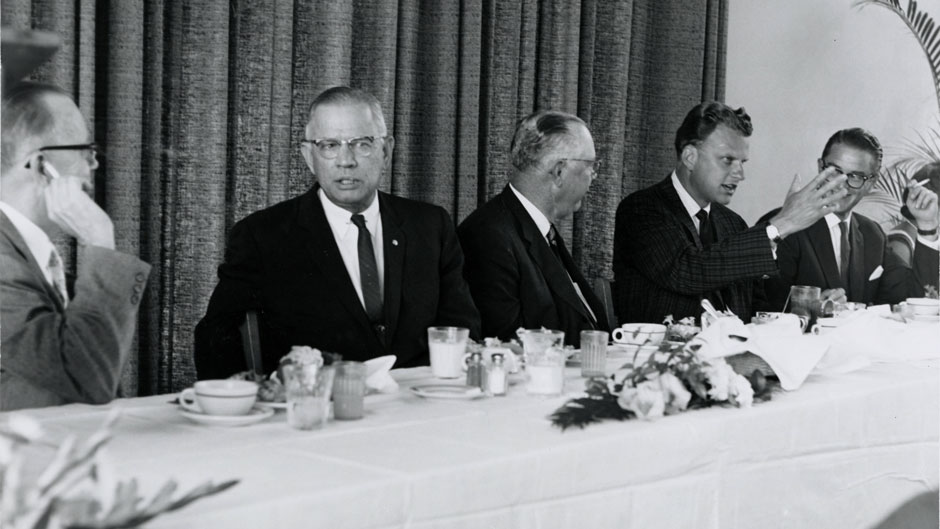The passing of Billy Graham (1917-2018) marks a milestone in the history of American Evangelicalism.
No Christian minister was more influential in global politics and faith in the 20th century. For over six decades, Graham preached to more people than any other evangelist in history--nearly 215 million people in person in 99 countries, and perhaps as many as 2 billion in live, closed-circuit broadcasts.
His message was simple, unwavering, and reassuring: repent of your sins, accept Jesus Christ as your personal savior, and be born again.
Raised by devout parents on a dairy farm in North Carolina, Graham attended a number of Protestant fundamentalist Bible schools before graduating from Wheaton College (IL) in 1943. After a pastorate in the Chicago suburb of Western Springs, he became a traveling evangelist for Youth for Christ, holding “crusades” in America and Britain.
Graham’s career took off in 1949 during a major crusade in Los Angeles, when the California newspaper baron, William Randolph Hearst, favoring Graham’s anti-Communism, instructed his reporters to “puff Graham.” Thanks to this unsolicited publicity, Graham became an overnight sensation, appearing on the front pages of Time, Newsweek, and later Life magazines.
While known in the early 1950s as a “fighting fundamentalist,” as time progressed Graham tempered his fundamentalism with a more mainstream evangelical message communicated in two best sellers, Peace with God (1953) and The Secret of Happiness (1955). He had his share of detractors, including fundamentalists who disowned him for his refusal to separate from “the world,” and progressive Protestants who criticized him for reducing all social issues and problems to personal sin. Yet Graham had the capacity for growth. He grew up in a segregated South, yet by the mid-1950s insisted that his crusades be fully integrated. He refused to conduct meetings in apartheid South Africa. His later support for the “war on poverty,” nuclear disarmament, and ecumenical bridge-building to Roman Catholic and Jewish communities placed him far ahead of the great majority of his constituents. An unofficial spiritual confidant to U.S. presidents, Graham was especially close to Richard Nixon. As the Watergate scandal unraveled, Graham’s critics accused him of ignoring the extent of misconduct.
Graham’s institutional influence was far-reaching. He was a major force in establishing the evangelical publication, Christianity Today, and he became involved in launching a number of important congresses on world evangelism. The Billy Graham Evangelistic Association (established in 1950) was the major arm of evangelism and outreach. Graham insisted that his own compensation from the association would be limited to his expenses plus that of a well-paid local minister. His sterling integrity and moral probity stood in contrast to the sex and money scandals that plagued a number of evangelists and broadcasters in the 1980s.
Graham’s wife, Ruth, died in 2007. He is survived by his two sons, three daughters, and numerous grandchildren and great-grandchildren. One of his sons, the well-known Rev. William Franklin Graham III, succeeded his father as head of BGEA in 1995.
David Kling is professor and chair, Department of Religious Studies at the University of Miami.

